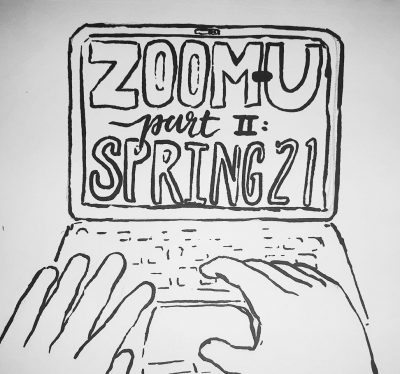The Learn from Anywhere model Boston University adapted this Fall seemed promising at the start of the school year. But at this point in the semester, hybrid learning has proved itself more burdensome than productive.
An online education is nowhere near the quality of in-person learning, but this dilemma is only worsened with hybrid classes. Simultaneously in-person and remote course formats are unnecessary to our education and ultimately cumbersome to maintain.

The most natural and meaningful classroom discussions take place when everyone is on the same playing field. In a hybrid environment, students in the classroom are yelling across the room to the instructor’s microphone and still, all the Zoom participants hear is a muffled response.
This environment doesn’t make class participation easy. How can students focus on engaging with material and answering questions when the professor is struggling to run their own Zoom meeting? Hybrid classes cause unnecessary confusion and waste valuable time that could be spent learning.
Holding in-person classes attracts people back to campus, but is not effective for a quality education. All classes should be remote if LfA continues next semester. Only labs are likely to benefit from remaining in person, with proper adherence to COVID-19 guidelines, but there are far too many technical difficulties and health risks to continue hybrid classes otherwise.
With more people in classrooms, students and faculty will have increased exposure to people outside of their social bubble. Even with capacity limits indoors, the threat of community spread remains.
And unlike students, professors are forced into these situations. They shouldn’t have to choose between their safety and job. Professors are typically at a higher risk of infection than college students because of their age, and also have to worry daily about bringing the virus home to their families.
We would all love to return to the normalcy of waking up, getting ready for the day and going to class, but that’s not a justification for putting people at risk for contracting COVID-19 or worsening the quality of learning through an experiment that’s producing mostly miserable results.
Students also went into this semester expecting more leniency because family circumstances around the world have been thrown into upheaval. But they haven’t always found that. Some professors are fairly strict about attendance, and have not been as understanding about remote emergencies or time zone differences.
Everyone is going through this weird, uncomfortable time together. As much as professors are in need of more lenient accommodations right now, students do as well. Considering BU has not offered Credit-No Credit this semester, at least so far, professors should consider allocating extra time to meet virtually with students and work on their grades with them.
Professors should also consider integrating breaks into class periods longer than 75 minutes. It’s already difficult to stay engaged with new material for such a long time in person, but the effect is amplified when students stare at a computer screen without interacting with any sort of real classroom environment.
Online learning has granted us a new flexibility to take classes from anywhere. If we are feeling under the weather or not up to leaving our dorms, we can Zoom in from bed. We also have easy access to lecture material now that they’re mostly recorded.
But this learning experience can be optimized if the University abandons the hybrid learning model and pivots toward an LfA model that means students who need a safe space to live can dorm on campus, but classes will no longer be split into this awkward format that makes everything harder for students and instructors alike.
Labs aside, students will learn much more efficiently when everyone can fully embrace online education rather than try to accommodate a halfheartedly in-person experience. Much of the time, students who attend class physically simply end up spending the duration on Zoom anyway.
This desire to hold on to the promise of “hybrid” learning should not compromise our education, and most certainly not our health.




















































































































